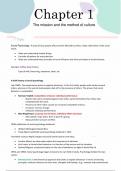Chapter 1
The mission and the method of culture
1st Topic
Social Psychology: A study of how people affect and are affected by others, helps make sense of the social
world.
Helps you understand simpler things.
Consider all options for every decision
Helps you understand basic principles of social influence and other principles of social behavior.
Example: Coffee shop choices.
Type of milk, flavouring, sweetener, bean, etc
A brief history of social psychology
Late 1800s: Two experiments point in opposite directions. In the first study, people work harder around
others, whereas in the second study people slack off in the presence of others. This proves that social
behavior is complicated.
Norman Triplett: Competition enhances individual performance
– Bicycle riders who competed against each other, performed better than those who
competed with the clock.
– Presence of other riders caused an increased competitive instinct.
– Increases ‘nervous energy’
– Enhances individual performance
Max Ringelmann: as group size increases, individual effort decreases
– Men pulled a rope alone, then as part of a group.
– Measured their amount of effort.
1908: publication of social psychology textbooks
William McDougall, Edward Ross
Floyd Allport published social psychology textbook in 1924
Twentieth century: Rapid changes and world events lead to new ideas.
Gordon Allport: an observation about the importance of attitudes
Kurt Lewin: a formula that behaviour is a function of the person and the situation
Stanley Milgram: conducted studies on the role of obedience (in light of World War II)
1950s and 1960s: Social psychology began to become its own field of study. Psychology divided into two
camps:
Behaviourism: is the theoretical approach that seeks to explain behaviour in terms of learning
principles, without reference to inner stats, thoughts and feelings. (e.g., rewards and punishments)
, Freudian psychoanalysis: is the theoretical approach that seeks to explain behaviour by looking at
the deep unconscious forces inside a person. (e.g., individual experiences )
Social psychology was not compatible with either.
It was more congenial with behaviourism, because it favoured experiments and the scientific method.
Social psychology: Combines the methods that use scientific approaches to measure behaviour, thoughts,
feelings and inner states.
Recent History: The study of cognitive processes
1. Attribution theory is based on attributions, which are explanations that people come up with in
order to explain behaviour. It evolved in the 1970s and 1980s into Social Cognition.
2. Biological and Evolutionary Psychology is where the basic ideas of evolution are used to understand
social behavior
3. Social neuroscience is an interdisciplinary field of study that investigates how biological systems
influence social thoughts and behaviours.
4. The study of the Self began in the 1970s, where it explored the many different aspects of the self.
These aspects include self-esteem, self-control, self-concept and self-presentation.
5. Group Conflict began in the 1980s, where people studied conflict in the free world. This included
political, racial and ethnic conflict. People tried to understand stereotyping, prejudice and
discrimination against stigmatised groups.
What do social psychologists do?
They aim to have a broad understanding of the social factors that influence how human beings
think, act and feel.
Social Psychology is concerned with the effect of other people (real or imagined) on our thoughts,
feelings and behaviour.
The ABC triad
1. Affect: How people feel inside. (How people feel about themselves and others)
2. Behaviour: What people do.
3. Cognition: What people think about.
Social psychologists are interested in how people feel about themselves, how they feel about others,
how they feel about various issues in the social world, and all behaviours people engage in.
When trying to explain some pattern of behaviour, the first place social psychologists look is the
situation.
Social psychology emphasis on how people react to the world around them; how small changes in their
immediate circumstances can produce substantial changes in behaviour.
Social psychologists study the influence of situational factors that people may not be aware of.
Embraces the scientific method.
Conduct experiments which are careful and systematic ways to test theories





